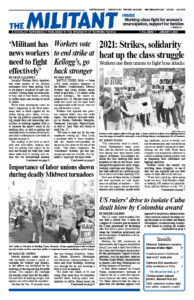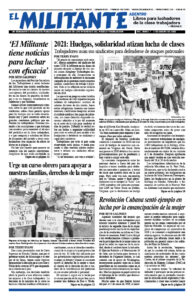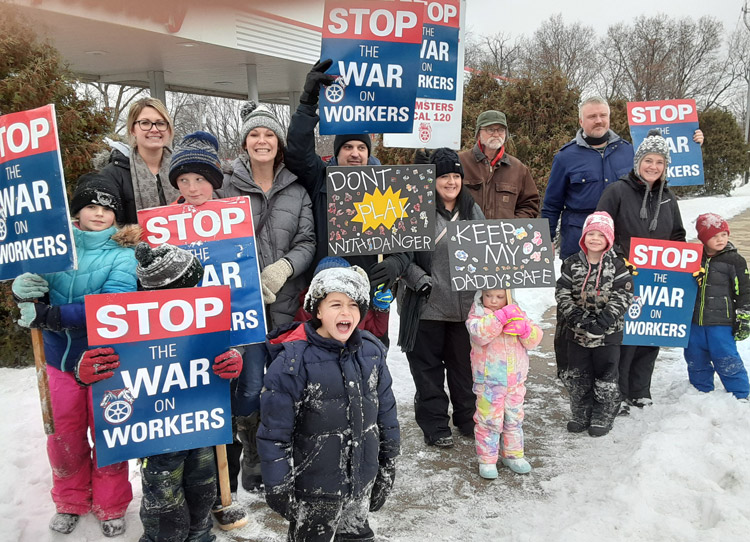NEW YORK — Paul Mailhot, a member of the Socialist Workers Party National Committee, spoke here Dec. 11 on the fight for women’s emancipation and the class-struggle road for workers to fight for political power — in the wake of a U.S. Supreme Court hearing on challenges to the 1973 Roe v. Wade ruling.
The 1973 Supreme Court decision, which decriminalized abortion, created a “right to privacy” for a woman and her doctor to carry out an abortion up to the point of “fetal viability,” roughly 24 weeks.
“It was more a medical procedures’ guide than codification of a broad working-class consensus in favor of women’s rights won through debate, discussion and action,” Mailhot said. “In fact, Roe v. Wade has been a blow to the fight for women’s rights and for the working class.”
Support for women to be able to get an abortion was growing in 1973, “but millions still had to be convinced why this right was integral to the broad range of rights women were fighting for,” Mailhot said.
Middle-class women’s groups reduced this broader fight into an abortion issue, unconnected to the broader questions of women’s emancipation and family formation. This allowed support for the right to choose to be portrayed as ignoring respect for human life.
Opponents of women’s rights took advantage of the flawed Roe v. Wade decision to make the fight against abortion the spearhead of their attack. “Since 1973 they have gotten some 1,300 laws passed in states across the country, putting obstacles in the way of women having control of their own bodies,” Mailhot said. Today there are no facilities in nearly 90% of U.S. counties where women can get an abortion.
Working-class starting point
“The framework for the debate working people need about women’s emancipation can’t start from abortion or the Roe v. Wade decision,” Mailhot said. “It starts with combating all the obstacles under capitalism to family formation in the working class and worse-off layers of the middle class. And with the second-class status of women and the way it underpins capitalist rule.”
The comments of several judges during the Dec. 1 hearings shows a Supreme Court majority is considering overturning Roe v. Wade, if not now, then down the line, Mailhot said.
But that won’t close off the needed discussion over how women’s rights are a key part of the broader fight of the working class against the attacks of the capitalist rulers and their government. This includes the need to advance all aspects of family planning, fighting for health care, society’s responsibility for contraception and child care, and more.
Debate over adoption
One aspect of this is the place of adoption. Judge Amy Coney Barrett noted that since Roe v. Wade adoption and “safe haven laws” make it easier for women to give up unwanted children without fear of being prosecuted. Why not talk about adoption as an alternative? she raised.
“Questions like the one asked by Barrett about adoption can’t be sloughed off as irrelevant — or even worse — ‘Catholic-minded,’” Mailhot said. They must be taken up from the standpoint of the working class.
“Among working people, adoption is a normal way of dealing with a societal need — couples who can’t have kids and giving a home to kids who don’t have one,” Mailhot said. Relatives and friends often take in children of people they are close to.
For most working-class families adoption is an exercise in class solidarity — a rejection of the ‘me and mine’ attitudes hammered into us by the capitalist class.”
“Two of the five children adopted by my sister and her husband were foster kids, who were never formally adopted but were taken in as part of their family,” he recalled. Mailhot described how a neighbor complained to his parents, “your daughter’s family looks like the League of Nations.”
“Along with fulfilling a need, I always thought my sister’s family helped break down prejudices in the small town where they lived and in my own family,” he said.
Mailhot pointed to a Dec. 2 article by Wall Street Journal columnist Peggy Noonan, who said that the Roe v. Wade ruling has generated such sharp debate because “Roe involved death.”
“But it is the capitalist system that is about death,” Mailhot said. “From the rulers’ wars, to the maiming and deaths of workers on the job, to the treatment of the elderly, to the thousands of women who lost their lives in botched abortions before the procedure was decriminalized.”
The fight for working people to decide how best to form a family, including for women to be able to choose to have an abortion, is about life, in the face of the pressures of the dog-eat-dog capitalist system.
The values the capitalist class puts on human life, he said, is reflected in the fact that “they hold the first year of college — and especially the first year of grad school — in higher regard than the first year of starting a family.”
Advancing human diversity
Mailhot urged forum participants to study the course charted by the communist leaders of the Bolshevik and Cuban revolutions.
He quoted the Soviet government’s 1920 “Decree on the Protection of Women’s Health.” It says, “By working for socialism, and by introducing the protection of maternity and infancy on an extensive scale,” it will be possible to achieve the gradual disappearance of abortion. (See article on facing page.)
At the same time, the decree codified the fact that “the Soviet government that came out of the Bolshevik-led Russian Revolution was the first government that ensured women had the right to a safe, legal abortion,” Mailhot said.
He pointed to an article in the Cuban daily Granma titled, “Cuba Has Broken the Barrier of Silence that the US Reinforces Against Its Deaf Community.” It reports extraordinary steps the Cuban government takes to get around the U.S. rulers’ embargo to provide hearing aids to those who need them and sustain its sign language interpretation service — a hallmark of its deep respect for human diversity.
“The working-class morality that provides the foundation for the Cuban government’s policies is also why it doesn’t encourage using abortion as a form of contraception, while ensuring it is free and accessible. In the face of the punishing U.S. economic war against Cuba, the government there is fighting to make birth control easily accessible and to improve the economic conditions for family foundation.”
Addressing the broader questions facing working people is key to advancing the fight for women’s emancipation, Mailhot said.
“In 2008 Hillary Clinton stated that abortion should be “safe, legal and rare,” he said. “How do you make it rare when having a baby and raising a family remains a challenging decision for millions of women and men today?” Capitalism in crisis is less and less able to provide conditions for workers to be able to form families, ensuring the choices women face about whether to give birth are harder and harder.
“The fight for jobs, protection from rising costs of living, universal health care, child care, decent affordable housing; access to family planning, including contraception and hospital-provided abortion; opposition to bureaucratic obstacles to working class families adopting children,” Mailhot said. “These are all part of the fight we need to wage in which women’s private right to choose to have an abortion fits.”
More men and women are standing together on picket lines to resist boss attacks around the country today, he pointed out. These battles include fights against cuts to real wages, forced overtime, life-draining schedules and other obstacles to family life. “That’s an encouraging sign for the future of the fight for women’s emancipation, which takes place around a broader range of issues today. And for organizing a working-class movement capable of taking power out of the hands of the capitalist class, the greatest enemy of the rights of women.”


